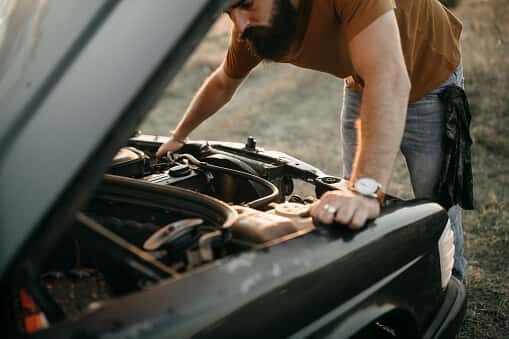What is a vehicle service contract?
Get coverage for your car after the original warranty expires

Vehicle service contracts, also called extended auto warranties, offer coverage for certain auto repairs. Most new cars come with a warranty from the manufacturer, but those warranties often expire while the vehicle is still in use. An extended auto warranty can help you cover the cost of fixing your car after the manufacturer's warranty is no longer in effect.
Key insights
- You might also hear vehicle service contracts referred to as “extended auto warranties,” though the two aren’t exactly the same.
- You can buy a vehicle service contract for just your drivetrain or your powertrain, or you can opt for a comprehensive bumper-to-bumper warranty.
- Some vehicle service contracts are transferable, which is important if there’s a chance you’ll sell your vehicle before your warranty term expires.
What does a vehicle service contract cover?
In general, vehicle service contracts cover repairs due to breakdowns or malfunctions in covered components. These covered parts and systems should be noted explicitly in the agreement you sign. Specific items may also be excluded from coverage. While individual contracts define coverages differently, policies are often available in roughly defined tiers, including:
- Powertrain coverage
- Powertrain-plus coverage
- Comprehensive coverage
- Exclusionary coverage
- Specialty coverage
Some vehicle service contracts also have coverage limits, meaning they might not cover the full cost of replacement parts in every case. Even if a part or system is covered in your agreement, you may have coverage for only a portion of the bill after the warranty company factors in your car's age and mileage.
General wear and tear, vandalism, theft, routine maintenance and damage from accidents generally are not included in extended warranty coverage. Warranties and service contracts often specify the conditions for coverage in the case of a necessary repair; if you fail to keep up with your car’s maintenance schedule, certain repairs may not be covered.
Before you decide to buy a specific auto service plan, read the fine print in the contract. It's essential to fully understand which systems and parts are covered and which are excluded.
A reviewer from Connecticut on our site learned this lesson the hard way: “The head gasket in my Audi broke and it's not going to be covered. When I read the fine print when the car was already at the mechanic, I found out that in order to have it covered, the mechanic would have to take the car apart and figure out if there was a lubricated part that caused the damage.”
The result: “That's pretty much doing the whole job and I'm required to pay for that. It's not like they pay upfront. … I believe I was misled, but I might just not have asked the right questions.”
» MORE: What does a car warranty cover?
Service contract vs. warranty
While the terms “vehicle service contract” and “extended warranty” are often used interchangeably, there are some technical differences.
Auto warranties
Auto warranties are issued by manufacturers to cover a new car for a specific amount of time or a certain number of miles, whichever comes first. A new car's warranty may only last three years or 30,000 miles, but it’s common to have different coverages for the powertrain and the rest of the vehicle. The cost of a new car warranty is almost always rolled into the vehicle’s sale price.
» STILL CONFUSED? Learn about manufacturer’s warranties
Vehicle service contracts
Vehicle service contracts, generally offered by third-party companies, can provide coverage similar to the manufacturer’s warranty, even for high-mileage cars. However, these contracts also allow for more flexibility than the one-size-fits-all plans from automakers.
Covered parts and systems vary by warranty company and the amount of coverage you choose. If you want a vehicle service contract to cover repairs after your warranty expires, you generally have to pay for it separately.
Most people don't need a service contract until their car's warranty is about to (or already has) expired, but there are vehicle service contracts you can use to complement an existing warranty. These plans are often called “wrap coverage” and are ideal for people who have an manufacturer's powertrain warranty but want more comprehensive coverage.
Be sure your warranty policies don't duplicate your coverage — you don't want to purchase an auto service contract that provides the same services as a plan you already pay for.
What does a vehicle service contract cost?
The cost of an extended warranty generally depends on the coverage you choose and your car's year, make, model and mileage. Your location is also a factor; repair costs vary widely across the country.
More coverage usually means a higher price. For example, a comprehensive plan that covers your car for five years or until your car has 100,000 miles (whichever comes first) should cost more than a drivetrain plan that lasts half as long.
Unless you pay for the whole thing upfront, your vehicle service contract will likely require you to make an initial down payment and monthly payments for a set period after. Extended warranties typically also include a deductible, which you'll pay each time you need to access your policy's benefits.
Vehicle service contract features to consider
Before you decide whether to buy an extended warranty, it's critical to understand how this type of contract may work in your favor. Research average repair costs for your car and compare those with the cost of purchasing an extended warranty.
Depending on the type of extended warranty you want, the cost of common repairs and the price of the vehicle service contract, this coverage might not make sense for you.
Here are some features worth considering to make sure you’re getting your money’s worth with an extended auto warranty:
- Policy cost: Many extended warranty companies require an upfront fee plus a monthly payment. You may also have to pay a deductible for every repair or visit to a mechanic. To come out ahead with a vehicle service contract, you need your policy to cost less than it saves you.
- Policy exclusions: Read through your policy line by line to understand which potential problems are covered and which aren't. Make sure the policy covers the systems that concern you most. If you worry about your car's electrical system or transmission but the policy excludes those repairs, keep shopping.
- Cancellation options: In some states, you can cancel an extended warranty for a certain amount of time after you purchase the policy. Learn about the company's cancellation policy and whether they prorate refunds.
- Coverage term: Before you buy a policy, understand precisely how long it will be in force. Does your warranty term start from the first day the vehicle was driven, or does it begin when you purchase the policy?
- Original manufacturer’s warranty: Are some of your car's parts and systems still under warranty? Hybrid, diesel-powered and electric vehicles may have coverage for certain parts beyond a traditional manufacturer's warranty.
- Transferability: Find out if the contract is transferable in case you decide to sell your car while it’s covered. If so, this could increase your car’s resale value.
Auto service contracts from third-party companies also don't work the same way as a manufacturer's warranty. Rather than having to use a dealership's service department, you may be able to use any local mechanic you prefer, for instance, so ask who can perform necessary repairs under your contract. If the agreement requires work from mechanics outside your area, getting claims paid may be tough.
Also, keep in mind that extended auto warranty scams are plentiful, so beware of callers who claim to know your personal information, including your car's year, make, model and warranty status. Never give in to pressure to make a quick decision. Get the warranty contract in writing so you understand exactly what coverage you'll have if you decide to buy.
Bottom line: Are vehicle service contracts worth it?
“An extended auto warranty can provide valuable protection against unexpected repair costs, particularly for older vehicles with high mileage,” Oliver Brown, owner of wheelssize.com, a vehicle information hub, said. “If your vehicle is outside of its original manufacturer warranty and you find the prospect of surprise repair bills daunting, a vehicle service contract may be worth it.”
Before you choose a policy, do your homework. Research reputable warranty companies and contact your state’s insurance commission to find out if your provider has complaints on file. Before you sign a contract, read it to make sure you understand the coverage (and that you can afford the down payment and deductible).
Sources
- Federal Trade Commission (FTC), “ Auto Warranties and Service Contracts .” Accessed Nov. 1, 2021.
- Federal Trade Commission (FTC), “ Businessperson's Guide to Federal Warranty Law .” Accessed Nov. 1, 2021.
- Federal Trade Commission (FTC), “ Buying a Used Car From a Dealer .” Accessed Nov. 1, 2021.
You’re signed up
We’ll start sending you the news you need delivered straight to you. We value your privacy. Unsubscribe easily.
